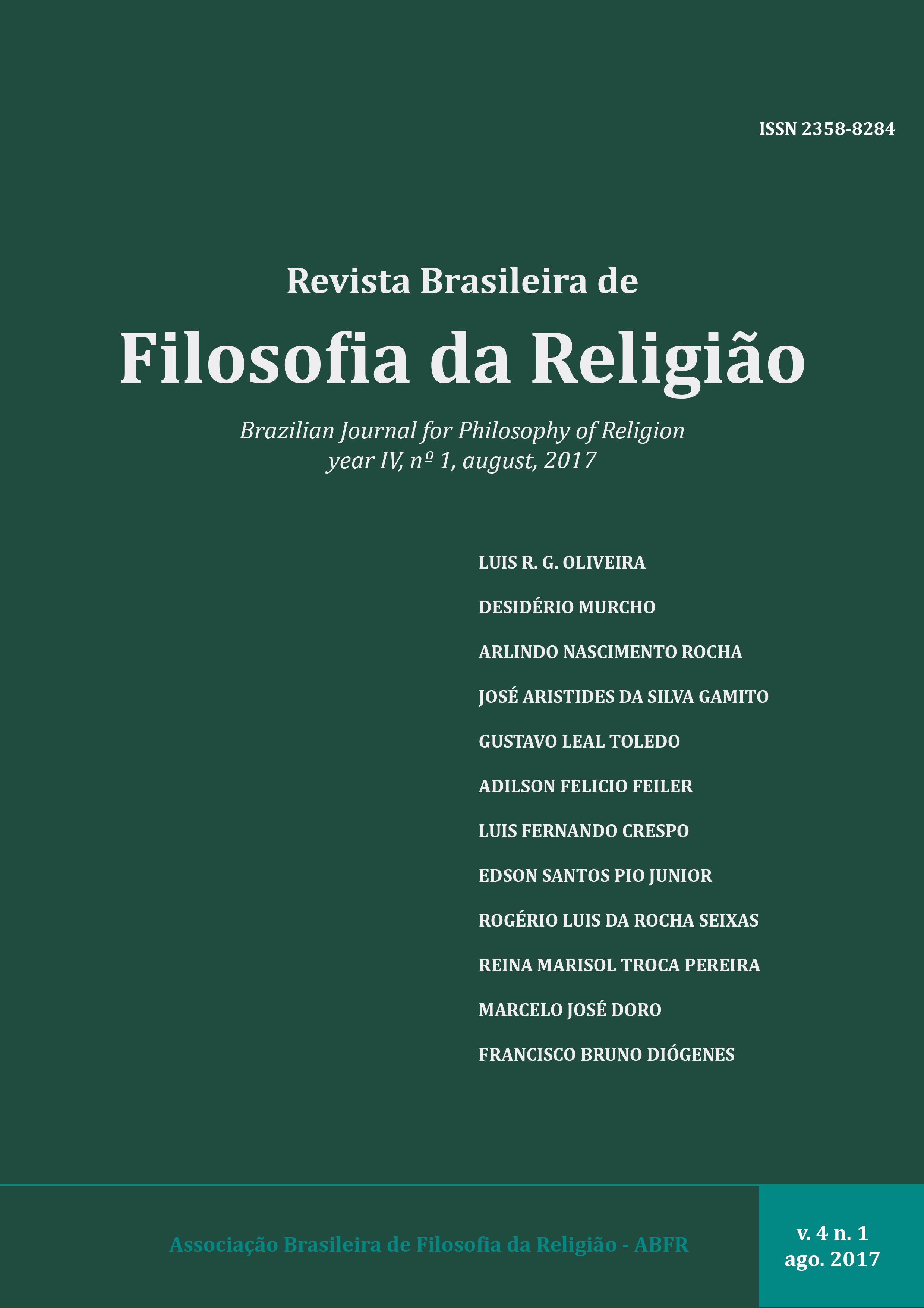DOS ERRORES DE ULISSES: INTERPRETAÇÃO ÉTICA DE UM MITO HOMÉRICO COMENTÁRIO E TRADUÇÃO
DOI:
https://doi.org/10.26512/2358-82842017e17696Palavras-chave:
mito; Ulisses; errores; tentações; virtudes.Resumo
Possivelmente da autoria de Mateus de Éfeso,
pseudónimo literário de Manuel Gabalas, o opúsculo
que se traduz neste artigo apresenta uma exegese
sumária sobre os errores de Ulisses descritos na
epopeia homérica. Em grego, o autor bizantino desfaz
os enigmas perpetrados por uma tradição mitológica
pagã, aproximando-os de um código de valores e
comportamentos patente no paradigma judaicocristão,
encontrando em Ulisses uma figura moral
modelar e paradigmática. As aventuras do herói
representam perigos e tentações que se apresentam
aos mortais, bem como a melhor forma de evitá-los,
reprimi-los e ultrapassá-los.
Downloads
Referências
BAKKER, E. ed.A Companion to the Ancient Greek Language. Blackwell Companions to the Ancient World. Literature and Culture. Chichester/Malden: Wiley-Blackwell,2010.
BROWNING, R. A Fourteenth-Century Prose Version of the «Odyssey».Homo Byzantinus: Papers in Honor of Alexander Kazhdan 1992, p. 27-36.
BROWNING, R. A Fourteenth-Century Prose Version of the Odyssey. Homo Byzantinus: Papers in Honor of Alexander Kazhdan, número 46 1992, p. 27-36.
BURGESS, J. The Tradition of the Trojan War in Homer and the Epic Cycle. Baltimore: JHU Press, 2003.
CICCOLELLA, F. Donati Graeci: Learning Greek in the Renaissance. Leiden/Boston: BRILL, 2008.
DAHAN, G., GOULET, R. Allégorie des poètes, allégorie des philosophes: études sur la poétique et l'herméneutique de l'allégorie de l'antiquité Ã la réforme. Paris: Vrin, 2005.
ERDOGAN, O. On the History of Religions in Philadelphia in Lydia until the End of Late Antiquity. MJH, número 4.1 2014, p. 171-179.
ERDOGAN, O. The Remains from Late Antiquity and the East Roman Periods and Their Location within the Lydian City of Philadelphia: New Comments. Mediterranean Journal of Humanities, número 5.2 2015, p. 251-274.
FATOUROS, G. Die Briefe Epist[olae] des Michael Gabras ca. 1290-nach 1350.Wien: Verlag der Österreichischen Akademie der Wissenschaften, 1973.
FOSS, C. The Defences of Asia Minor Against the Turks. Greek Orthodox Theological Review, número 27 1982, p. 145-205.
FOSS, C. Ephesus After Antiquity: A Late Antique, Byzantine and Turkish City.Cambridge: Cambridge University Press, 1979.
FRYDE, E. The Early Palaeologan Renaissance 1261-c. 1360.Leiden/Boston. BRILL, 2000.
HUNGER, H., KRESTEN, O., HANNICK, C. Katalog der griechischen Handschriften der Österreichischen Nationalbibliothek 3,2: Codices theologici 101-200. Wien: Hollinek, 1984.
KOUROUSES, S. Manouèl Gabalas eita Matthaios mètropolites Ephèsou. Athènes, 1972.
Long, A. Stoic Studies. Cambridge: Cambridge University Press, 1996
LUCE, J. Homer and the Homeric Age. New York: Harper & Row, 1975.
MACDONALD, D. Christianizing Homer: The Odyssey, Plato, and the Acts of Andrew. New York/Oxford: Oxford University Press, 1994.
MANDZUKA, Z. Demystifying the Odyssey. Bloomington: Author House, 2013.
MERTZ, H. The wine dark sea: Homer's heroic epic of the North Atlantic. Chicago: Mertz, 1964.
MONTANARI, F., MATTHAIOS, S., RENGAKOS, A. eds. Brill's Companion to Ancient Greek Scholarship, 1-2.Leiden/Boston: BRILL, 2015.
NAGY, G. Homeric Questions Austin: University of Texas Press, 1996.
NIEHOFF, M. ed. Homer and the Bible in the Eyes of Ancient Interpreters. Leiden: BRILL, 2012.
PERES-JEAN, B., EICHEL-LOJKINE, P. L'Allégorie de l'Antiquité Ã la Renaissance. Paris: Champion, 2004.
PREVIALE, L. Due monodie inedite di Matteo di Efeso. BZ, número 41 1941, p. 4-39.
REINSCH, D. Die Briefe des Matthaios von Ephesos im Codex Vindobonensis Theol. Gr. 174. Berlin: Mielke, 1974.
RUSSELL, D., KONSTAN, D. Heraclitus: Homeric Problems. Writings from the Greco-Roma World, 14. Atlanta: Society of Biblical Literature, 2005.
Schreiner, P.Zur Geschichte Philadelpheias im 14. Jahrhundert 1293-1390. Orientalia Christiana Periodica número 35 1969, p. 375-431.
TREU, M. Matthaios Metropolit von Ephesos. Über sein Leben und seine Schrfiten. Potzdam: Programm des Victoria-Gymnasiums zu Potsdam, 1901.
TROCA PEREIRA, R. ΠΕΡΙ ΑΠΙSΤOÎ Sobre Fenómenos Inacreditáveis. Paléfato. Heraclito. Anonymus. Journal of Ancient Philosoph. número 10.2, 2016, p. 140-302.
VIANÈS, L., SAMRA, A. Les Errances d'Ulysse par Matthieu d'Éphèse, alias Manuel Gabalas XIVe siècle. Gaia: revue interdisciplinaire sur la Grèce Archaïquenúmero 7.1 2003, p. 461-480 .
VRYONIS, S. The decline of medieval Hellenism in Asia Minor: and the process of Islamization from the eleventh through the fifteenth century. Berkeley: University of California Press, 1971.

